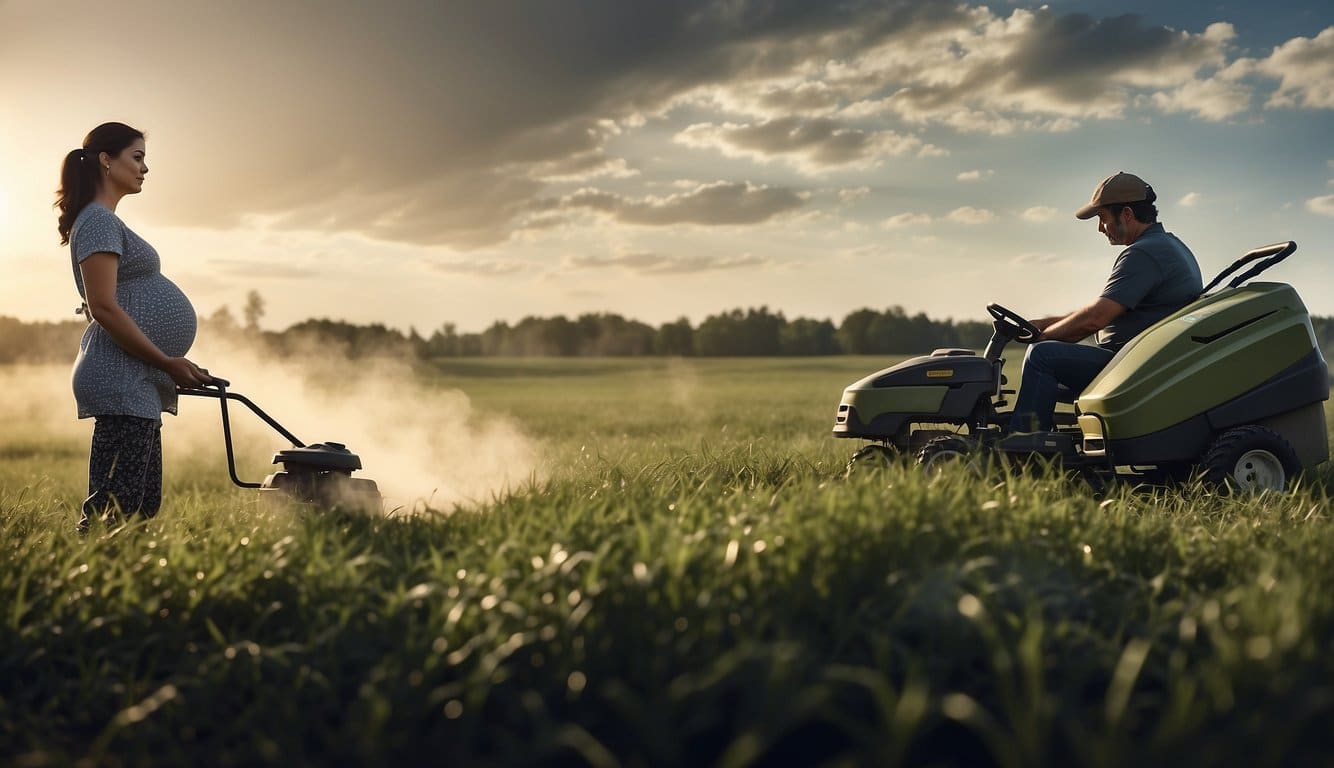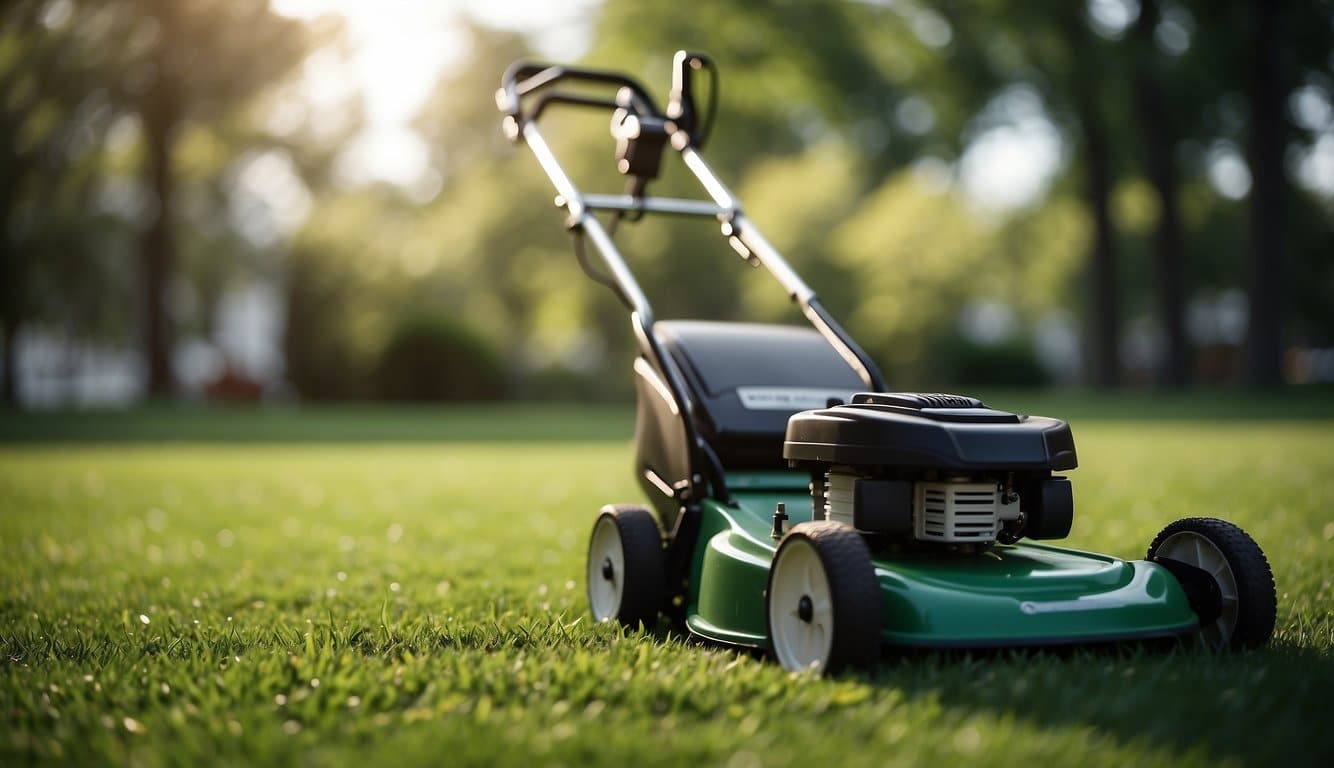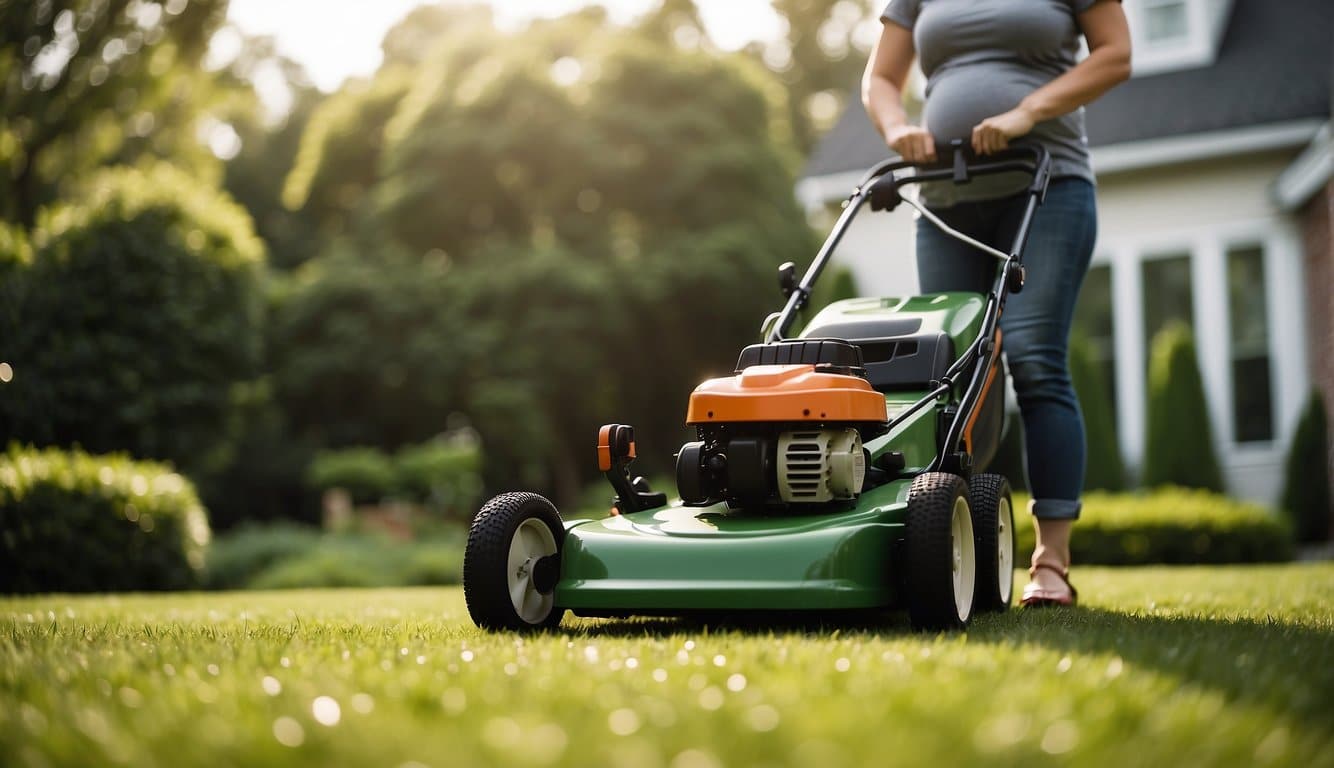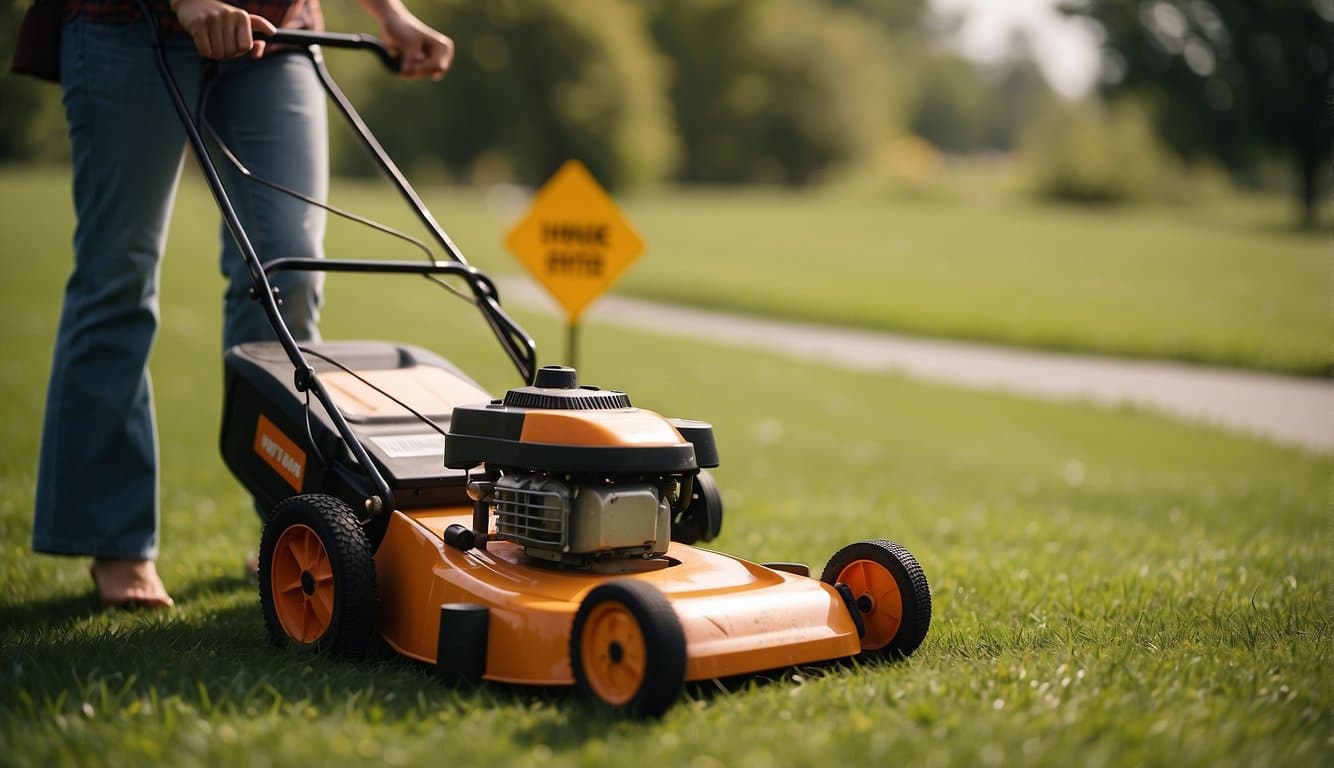Editors note: We could not find images of pregnant women mowing the yard, so we used A.I. image generation. The results are… interesting. Also, congratulations on the upcoming addition to your family! Ok, back to our regularly scheduled article.
Mowing the lawn is a common household task that might raise concerns for expectant mothers about the potential risks involved, especially in relation to miscarriages.
The question of whether this activity could adversely affect pregnancy outcomes surfaces among many safety considerations during pregnancy.
Evidence suggests that mowing the lawn is generally safe for pregnant women, provided that they do not overexert themselves and the pregnancy is not classified as high-risk.
The primary concern lies in the physical exertion required, particularly if the mother-to-be is pushing a heavy mower, and the environmental conditions, such as extreme heat, which may contribute to risks.
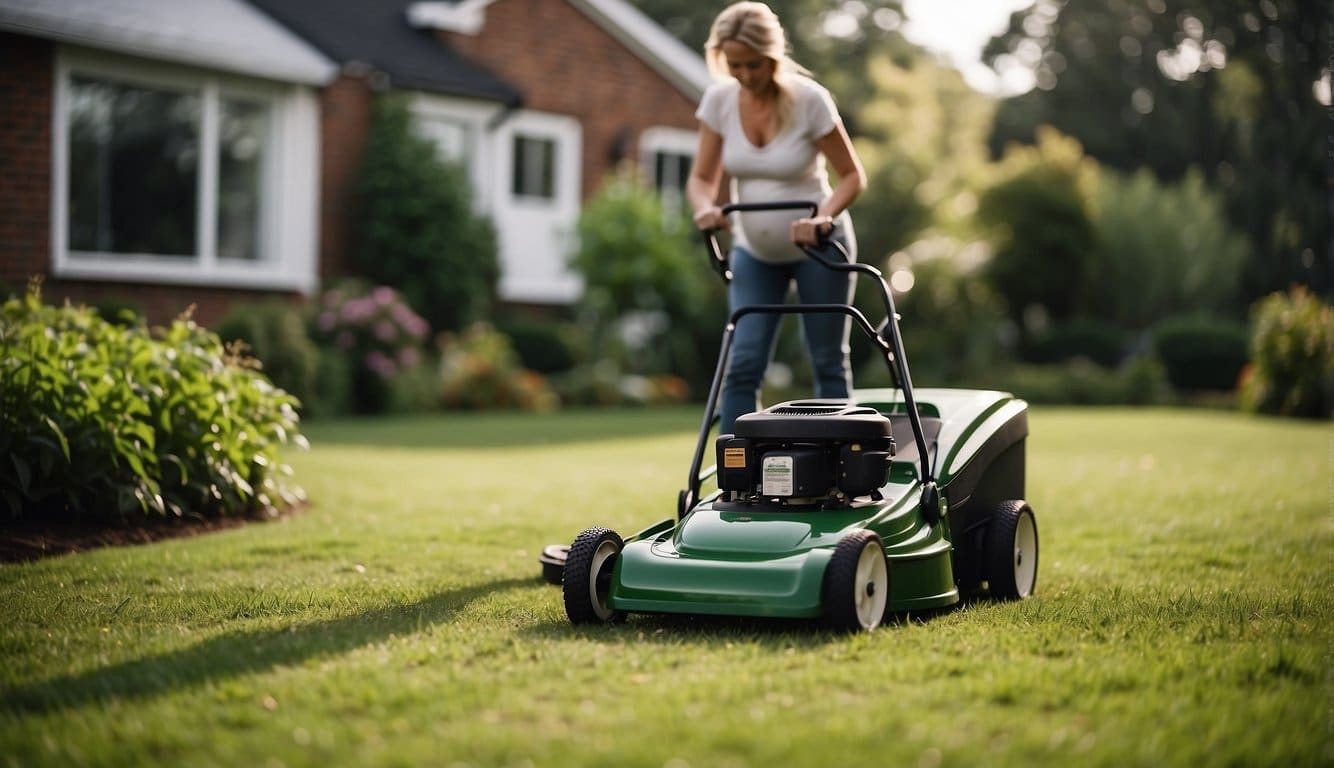
The vibrations from lawn mowers have also been a point of speculation with respect to their effect on pregnancy. However, research indicates that these are unlikely to cause harm or lead to miscarriage.
It is important for pregnant women to be mindful of their bodies’ signals and prioritize rest as needed while engaging in this form of physical activity.
Safety precautions, such as staying hydrated, wearing appropriate protective gear, and avoiding mowing in excessively hot weather, are advisable to reduce any risks associated with lawn mowing during pregnancy.
Key Takeaways
- Lawn mowing is considered safe during pregnancy aside from high-risk cases and overexertion.
- Vibrations from lawn mowers are unlikely to harm the pregnancy or increase the risk of miscarriage.
- Pregnant women are advised to follow safety guidelines, including taking breaks and staying hydrated, when mowing the lawn.
Health Risks of Lawn Mowing during Pregnancy
When expecting, women should be aware of certain health risks that can arise from mowing the lawn. These concerns include physical strain, potential exposure to chemicals, and the impact of noise on stress levels.
Physical Strain and Overexertion
The physical demand of pushing a heavy lawn mower can lead to excessive strain, especially in the later stages of pregnancy.
Pregnant women might find it increasingly challenging to maneuver the mower as they approach the third trimester, potentially raising the risk of injury or overexertion.
- Risks:
- Increased heart rate
- Raised blood pressure
- Preterm labor from strenuous activity
Exposure to Harmful Chemicals
Pesticides or herbicides commonly used in lawn care could contain chemicals harmful to a developing fetus.
Direct contact or inhalation of these chemicals by the mother increases the risk of adverse health effects.
- Precautive Measures:
- Wear protective clothing
- Read chemical labels carefully
- Opt for natural weed and pest control methods
Noise-Induced Stress
Long-term exposure to the loud noise of a lawn mower could potentially contribute to increased stress levels.
As stress has been linked with negative pregnancy outcomes, limiting noise exposure may be advisable.
- Source of Noise:
- Gas-powered lawn mower engine
- Trimming and edging tools
The Impact of Vibrations from Lawn Mowers
When assessing the safety of lawn mowing during pregnancy, one aspect that requires attention is the impact of vibrations from lawn mowers.
Vibrations produced by lawn mowers come from the engine and moving parts, such as the blades.
Although these machines are designed for everyday yard maintenance, their vibrations have the potential to reach a user standing on or behind the device.
Key considerations include:
- Intensity: The vibrations’ strength varies depending on the mower’s model and condition. A well-maintained mower typically generates less intense vibrations.
- Duration: The length of exposure to vibrations plays a role, with prolonged use potentially increasing any effects.
- Frequency: This refers to how often a pregnant individual operates the lawn mower, with infrequent use less likely to impart significant impact.
Body Response to Vibrations:
- Physical Discomfort: Operating a vibratory machine like a lawn mower might cause discomfort, particularly in the later stages of pregnancy.
- Fatigue: The stress of handling a lawn mower may lead to fatigue, which can be further intensified by vibrations.
Safety Guidelines for Pregnant Women Mowing the Lawn
When pregnant women choose to mow the lawn, they must do so with caution, adhering strictly to safety guidelines to minimize any risks to themselves and their babies.
Proper Mowing Techniques
- Listen to Your Body: A woman should only take on mowing if she feels comfortable and should take frequent breaks to avoid overexertion.
- Stay Hydrated: It is crucial to drink plenty of water to prevent dehydration, especially when engaging in physical activities like mowing the lawn.
- Mow During Cooler Hours: To avoid heat stress, mowing should be done during the cooler parts of the day, either early morning or late afternoon.
- Use Right Mower: Opt for a lightweight push mower that’s easy to maneuver without straining.
Protective Equipment Use
- Wear Gloves: To protect hands from blisters and prevent slipping on the mower handle.
- Protective Footwear: Closed-toe, non-slip shoes are essential to safeguard feet and provide stability.
- Hearing Protection: If using a loud mower, ear protection is recommended to prevent hearing damage.
Alternative Lawn Care Options
- Hire a Service: If physical activity or exposure to allergens is a concern, hiring a professional service is a safe alternative.
- Family or Friends Help: Consider enlisting the help of family or friends to take on lawn care tasks during the pregnancy.
- Switch to Low Maintenance Lawn: Pregnant women may opt to have a lawn that requires less frequent mowing, such as one with ground cover plants or artificial turf.
Frequently Asked Questions
This section addresses common queries about the activity’s safety and potential risks during pregnancy.
Is it safe for pregnant women to use riding mowers?
For pregnant women, operating a riding mower may be considered safer than pushing a walk-behind mower due to reduced physical exertion. However, they should only use riding mowers on flat terrain and avoid bumps or uneven ground to prevent risk of injury.
What activities should be avoided during the third trimester of pregnancy?
During the third trimester, pregnant women should avoid heavy lifting, activities that carry a fall risk, and those that require a significant amount of exertion or balance, as these can increase the risk of injury or preterm labor.
Are there risks associated with mowing the lawn during the first trimester?
Mowing the lawn in the first trimester carries some risk due to the physical exertion involved. If a pregnant woman has been advised by her healthcare provider to limit physical activity, operating a lawn mower may not be recommended.
Could physical activities impact pregnancy after an embryo transfer?
After an embryo transfer, most healthcare providers suggest limiting strenuous physical activities to protect the implantation process. Activities that require jarring movements or heavy exertion, including mowing the lawn, may need to be postponed.
What are the potential risks of using power tools, such as electric sanders, during pregnancy?
Using power tools, like electric sanders, can pose risks due to vibration, heavy lifting, and the potential for inhaling dust. Pregnant women should wear protective gear and work in well-ventilated areas if using such equipment, or better yet, avoid them if possible.
How can physical exertion affect the likelihood of a miscarriage?
Physical exertion does not generally cause miscarriage, but it’s recommended to avoid overexertion, particularly in high-risk pregnancies.
Women who experience symptoms like dizziness, dehydration, or overexertion while doing any physical work should stop and consult their healthcare provider.
